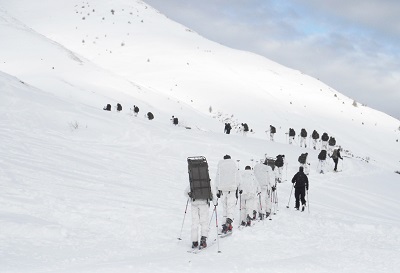Becoming Alpini: A Top-Notch Broadening Experience Through the Military Personnel Exchange Program
LTC Thomas M. Hough

Soldiers with the Italian Army’s 8th Alpini Regiment conduct winter warfare training. (Photo courtesy of the author)
Over the past year I have had the great privilege to serve in a broadening assignment with the Italian Army as a member of the “Julia” Alpini Brigade (Mountain Infantry). For officers serving in basic branches such as Infantry, Armor, Aviation, Field Artillery and others, opportunities such as this are possible through the Department of the Army Military Personnel Exchange Program (MPEP). The U.S. Army has exchange positions in multiple combatant commands, and positions range from the tactical to strategic level. As the decade plus of combat operations draws toward an end, it has become clear that broadening is an important component of an officer’s professional development. If working in and gaining a better understanding of the multinational environment interests you, then you should consider applying for the MPEP, a top-notch broadening opportunity.
Broadening
At this point in your career, you are more than likely familiar with the concept of broadening and should be thinking about what broadening opportunities interest you the most. The Army Leader Development Strategy (ALDS) identifies different time periods during an officer’s career where broadening should be the focus (see Figure 1). As part of ALDS, the Chief Of Staff of the Army has identified numerous new broadening opportunities that the Department of the Army is pursing to include “increasing the number of personnel exchanges with our closest allies.” Serving as an exchange officer with one of our allies is just one of many ways in which you can participate in a broadening program.
No matter which broadening option you choose, what is clear from the timeline in Figure 1 is that broadening is important to your professional leader development. If you are like most of us serving in the Army, we have given considerable thought throughout our careers as officers and senior NCOs as to where we wanted to serve. As much as possible we try to align our career timelines to ensure we have the right positions at the right rank and for the right amount of time. Broadening should be no different. The officer who will invest the same amount of time and energy to plan for and prepare for his or her next broadening assignment will likely find a myriad of opportunities such as the MPEP that many others are simply unaware of.
MPEP
MPEP provides unique opportunities as well as some challenges. You should read AR 614-10, Army Military Personnel Exchange Program with Military Services of Other Nations, before making a decision. As an MPEP participant, you will most likely report to the Army Service Component Command that is responsible for the region in which you reside. For my position in Italy, my higher headquarters throughout my exchange assignment was U.S. Army Europe. If you choose to pursue one of these positions or an MPEP position in another combatant command, here are some additional considerations:
You might need to learn a foreign language: Depending on the country, you may need to attend the Defense Language Institute (DLI) if you do not already possess the required language skill. For many basic branch officers, the opportunities to attend DLI are rare and a real benefit if you get the chance. Be advised that DLI is a rigorous course regardless of the language. Also know that your language training is not finished just because you complete your basic language course at DLI. Once in country, I found it necessary to continue to study every day and made language training a part of my daily battle rhythm. As your language improves, you will become a more valuable member of the team and the better your language capability, the greater the experience will be. If you are willing to commit to completely immersing into your new environment, you will not only improve in your language but also earn the respect of your host army.
You and your family should be prepared to live remotely: While every experience will be different, your family can anticipate immersing in the host-nation culture as well. If living outside the supporting range of a U.S. military installation, then you will need to become familiar with programs such as TRICARE Remote and the Non-Department of Defense (DoD) Schools Program if you have children. The DoD already has the infrastructure in place to support you and your family in a remote location; your task will be learning how to navigate through these programs.
You can deploy as an exchange officer: Some exchange assignments are with operational units. I deployed to Afghanistan with my exchange unit less than 90 days after arriving. If selected for an MPEP position, you should contact the U.S. Army Service Component Command and your new unit. Some of our allies have operational deployments to locations where the U.S. Army does not currently have an operational footprint. If authorized by the Secretary of the Army, an MPEP officer can deploy with his host nation. You will need to begin your preparation as soon as possible.
Multinational Broadening Lessons Learned
First, let me caveat this by saying that these are only my observations and lessons learned from my experience. Every MPEP officer or NCO is going to have vastly different experiences based on operational vs. institutional exchange, deployments, language proficiency, and many other variables. What I have listed below are the major lessons learned from my experience as an exchange officer that were not the most obvious or intuitive when I first started.
•Your key task is building military-to-military relationships: Shortly after my Italian regiment had assumed control of Regional Command-West I was in my commander’s office when a senior U.S. Army officer called my commander. This officer knew my Italian commander from a previous assignment and spoke excellent Italian. This officer had clearly taken the time to build a relationship with my commander over the years. It was in that moment that I understood the true value of the exchange program. The ability to pick up the phone and talk to a general officer from one of our closest allies in their own language is invaluable. Imagine the number of issues that could be resolved just from having this level of rapport and the value of these relationships for our Army.
•Don’t assume that all our allies speak English: Prior to this assignment I assumed that most, if not all, of our NATO allies spoke English. I had never really thought about what it would be like to sit through meetings or video teleconferences being conducted in a language other than your own. What I found was that while most of my Italian brothers can speak some English, they still struggled to keep up with a presenter who talks too fast or a video teleconference with poor sound quality. What I also found was that most U.S. Army officers and senior NCOs are completely insensitive to this issue as speaking a foreign language is not a normal part of our culture. I learned firsthand what this experience can be like as I struggled for the first couple of months to keep up with conversations or meetings. As you can imagine, it can be very intimidating. Fortunately, my Italian counterparts have all suffered through this as well and were very willing to help me along the way. After a few months, I was able to put the language barrier behind me and became a much more valuable member of the team. Additionally, once I gained some real proficiency in the language, I found myself being invited to more and more events such as promotions, video teleconferences, or even just dinner with friends. I found that language was the key to building personal relationships.
•Perspectives matter: If you are going to succeed in the multinational environment, you must be willing to look at the operational environment from the perspective of our allies. Much like our Army, many of the geo-political constraints that our allies must contend with are outside of their ability to influence. Work with your multinational partners to figure out what they can and cannot do and what levels of risk they are authorized and willing to accept. By knowing this information, you can help plan operations they can do and not operations that they are unable to support.
•Think strategically: The next time you get the opportunity to work in the multinational environment, or if you get the opportunity to serve as an exchange officer, keep in mind that maintaining our long-term relationship with our allies is much more important than whatever the tactical problem of the day might be.
•Be the part: We, Soldiers of the U.S. Army, have a great reputation with our allies for our professional, disciplined force. In a position such as this you are the only one who will hold yourself accountable for maintaining U.S. Army standards. There is no need to go “native.” Be the standard bearer for the U.S. Army while representing our great Army as a member of a multinational force. Both your host nation and the U.S. Army expect nothing less.
Conclusion
Change is not the exception, it is the rule. Anyone who has been deployed over the past few years understands the complexity of the environment that we, the U.S. Army, will continue to operate in. Multinational operations are a part of that change; they have become a normal part of the operating environment. If you are looking for an opportunity to engage with and learn how to effectively operate in the multinational environment, then volunteering for the MPEP may be right for you.
LTC Thomas M. Hough is currently serving as commander of the 1st Battalion, 5th Infantry Regiment (Bobcats), 1st Stryker Brigade Combat Team (SBCT), U.S. Army Alaska. As a part of the U.S. Army’s Military Personnel Exchange Program, LTC Hough attended the Defense Language Institute in Monterey, Calif., and arrived in Udine, Italy, in January 2013. He deployed to Regional Command-West, Afghanistan, with the Italian Army’s “Julia” Brigade in March 2013 as the deputy J35 for RC-West and later as the J35.

 Share on Facebook
Share on Facebook email
email print
print